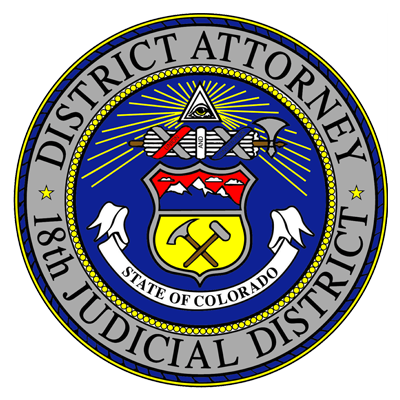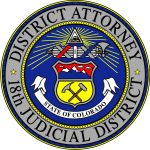In three major decisions announced today, the Colorado Supreme Court resoundingly upheld the constitutionality of Colorado’s DUI laws. Deputy District Attorney Jennifer Gilbert of the Appeals Unit of the District Attorney’s Office for the 18th Judicial District handled all three appeals on behalf of the People.
District Attorney George H. Brauchler called the rulings a major victory for law enforcement not only in Colorado but also nationwide: “Suspected drunk drivers were using some recent U.S. Supreme Court decisions to challenge our DUI laws to preclude the use of previously admissible evidence of their intoxication at trial. Most states have laws similar to ours. Had our state Supreme Court had gone the other way, DUI laws across the country could have been in danger. Instead, we have some really good law that will enable law enforcement in Colorado and across the country to continue to aggressively fight against the scourge of drunk driving. This is a major victory for law enforcement nationwide. I want to congratulate Deputy District Attorney Jennifer Gilbert and our appellate unit – the best in Colorado — on an outstanding job on these cases.”
The three cases involved different aspects of Colorado’s Expressed Consent Law, which says that by driving in Colorado, drivers expressly consent to a blood or breath test to determine their blood alcohol content if the police have probable cause to believe that the driver has committed an alcohol-related driving offense.
One of the aspects of the Expressed Consent Law is that if a driver refuses to give a blood or breath sample when requested by a police officer with probable cause, the act of refusal can be used as evidence against the defendant in a subsequent criminal trial. In Fitzgerald v. People , the Supreme Court held that the Fourth Amendment does not preclude the admission of such a refusal — in other words, a refusal to give a blood or breath sample can be used against a defendant in a criminal case. A refusal to provide a previously consented to breath or blood sample is not a statement governed by the Fifth Amendment prohibition on compelled self-incrimination.
When police officers in Colorado have probable cause to suspect a driver has committed an alcohol-related driving offense, officers read the defendant what is called an “expressed consent advisement.” This advisement describes the Expressed Consent Law and informs drivers that by driving in Colorado, they have already consented to a blood or breath test. It also advised the driver of the consequences of refusing to participate in such a test, including a driver’s license suspension.
In People v. Simpson, the district court had ruled that the very act of reading a driver an expressed consent advisement made the subsequent test inadmissible. The Supreme Court held that reading a suspect the Expressed Consent advisement does not render a subsequent chemical test involuntary.
Deputy District Attorney Jennifer Gilbert explained the importance of this opinion: “If this had been allowed to stand, it could have invalidated every breath or blood test that a driver in Colorado provides as part of a DUI investigation, which would obviously have huge ramifications. That is why we pursued this appeal so vigorously, and that is why we are so happy that the Supreme Court agreed with us.”
In People v. Hyde, the Supreme Court held that a Colorado peace officer with probable cause to believe that an unconscious driver has committed an alcohol-related driving offense can order a blood test of the unconscious driver, based on the fact that the driver has expressly consented to the test under the Colorado Expressed Consent Law, and that no separate search warrant is needed.
All three defendants have the right to seek further review in the U.S. Supreme Court. Chief Deputy District Attorney Rich Orman said he anticipated that was likely to happen: “I think that one or more of these defendants will likely ask the U.S. Supreme Court to review these issues. Based on the low percentages of cases that the Supreme Court takes, the odds are against them, but you never know.”
###



